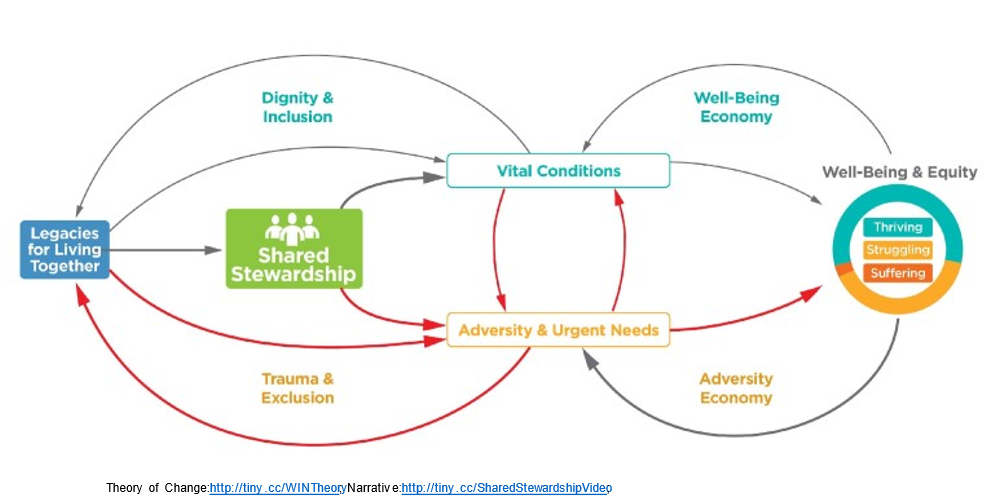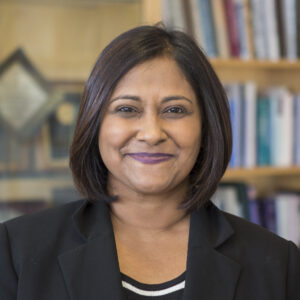I have spent my whole life seeing firsthand the difference between being wealthy and being abundant, as individuals and as communities. I was lucky to learn this as a child from my mother, a powerful woman who never let any financial difficulty hold her back from dreaming or giving or investing in others. Every night growing up, we would stand with my mother in the veranda outside our home when we lost electricity, urging me to look at the world around us at people who had so much less than us, urging me to reflect on the gifts and talents I had to give to make life better than those who had less.
Looking back, I know that we didn’t have much—we were financially insecure, housing insecure, and energy poor. But through my mother’s view, what I saw instead was the abundance and resourcefulness we had within us and that the vast majority of hardworking women, men, and children who were considering “poor” had within them. I learned early on that the path to sustainable development was not to merely help the poor, it was to trust “the poor,” to believe in their potential and remove the barriers that our society has created to keep people in poverty.
Over the last 25 years, in my work through the Well Being In the Nation Network, 100 Million Healthier Lives, and my own personal journey, I have had the privilege of watching those who are considered “poor,” “underserved,” and “vulnerable” utterly transform their outcomes, when systemic barriers are removed from their path and they are given enough support and accompaniment to become leaders of their own solutions. In Guyana, through the Baha’i Community Health Partnership and Varqa Foundation, this approach led to 90% reduction in malaria rates while eliminating malnutrition among widows through solutions developed by community health workers, villagers, and teachers with a fifth-grade education. In Wisconsin, youth who were formerly homeless created opportunities for themselves that led to a 50% reduction in homelessness within 100 days. The Family Independence Initiative in the US and the international microfinance movement led by Grameen Bank has shown that family and (especially) women-led solutions contribute to two generation improvements in outcomes in education, income and community prosperity.
To have an equity and well-being-based economy, we need to first reframe our understanding about why some groups remain in poverty and are marginalized from the economy—communities of color, indigenous communities, women, people with disabilities, those living in rural areas, and those who have been stigmatized and marginalized— those we have seen as poor but in fact are simply those we have chosen structurally to exclude or harm.
The WIN Theory of Change (Figure 1) suggests that there are legacies for living together that we have built as part of our social contract over generations. Some of these lead to dignity and inclusion which assures that these groups have the vital conditions they need to thrive (basic needs for life and health, humane housing, access to lifelong learning, meaningful work and wealth, reliable transportation, a sense of belonging and civic muscle). Others lead to systematic trauma and exclusion and create poor physical health, mental health, social and life outcomes. Our society has overinvested in a whole array of reactive, urgent services—from emergency rooms to short-term social services to prisons—to deal with the perceived accepted reality that trauma and exclusion will continue to operate and harm—rather than assuring the vital conditions everyone needs to thrive. This creates the foundation of an adversity-based economy, one in which we rely, for example, on cheap prison labor to fuel large-scale public and private infrastructure at greatly substandard wages and creates a persistent system of modern-day slavery.
To shift to an equity and well-being-based economy, we need to acknowledge the legacies that have gotten us here, and in relationship with those affected by racism and other inequities, shift our core mindsets, structures, and systems to assure the vital conditions for everyone. One of these core structures represent a different set of policies and incentives to guide an equitable, well-being economy.

To do this will not be easy because it requires us to reframe our beliefs about the gifts and potential those who are poor have to offer, on a foundation of truth reconciliation in partnership with community residents affected by inequities, and interrupt the cycle of intergenerational poverty through shared co-investment. This requires a new social contract.
These ideas—that we are interconnected, that those who are “poor” are abundant in their gifts and potential, that these gifts cannot be expressed because of systems of oppression, that achieving equity is about unleashing trapped and untapped potential and creating pathways that lead to mutual abundance—represent a fundamentally different basis for the root constructs of our economy and creates the foundation for a renewal of our social contract to support everyone to thrive together.
The Well Being In the Nation (WIN) Network has been exploring what renewal could look like in our social, emotional, civic and economic lives. In the winter 2021 National Civic Review, Bobby Milstein authored an article about how we can begin to reframe values and markets, acknowledge past and current legacies, and assure the vital conditions everyone needs to thrive, using the WIN Thriving Together Theory of Change as a basis. The WIN Equitable Policy Agenda has developed a database of policies to advance an equitable economy together with Black, Indigenous and People of Color centering organizations, community residents experiencing an inequitable economy. WIN with Business, a cooperative of the WIN Network that reaches hundreds of small, medium, and large businesses, has been applying these concepts to explore how businesses can help to advance a just and thriving society in the short, medium, and long term. We have been fortunate to have Invest Health as a partner in these conversations.
During Spring WIN Week 2021, between April 23rd-30th, 2021, the WIN Network will explore what economic, social, and civic renewal looks like at the intersection of race and place. We welcome you to join us in co-creating a conversation that shifts the way we all think and act to create the foundation of a well-being economy that allows us to thrive together.
About the Author
 Somava Saha is the Founder & Executive Lead of Well-Being and Equity (WE) in the World and the Well-Being In The Nation (WIN) Network, growing strategic network working together to advance intergenerational well-being and equity. WIN begins with a recognition that the legacies of the past and the policies, structures, and beliefs we choose to live with shape our current reality. Some of these have led to well-being, dignity, and inclusion. Others, such as our legacy of slavery and structural racism continue to perpetuate trauma, poor health, and exclusion. These past legacies of exclusion affect communities across the country today. They help a hundred million people to participate, prosper, and reach their full potential. This is a legacy moment in our nation. It is our obligation to make decisions today that will expand the vital conditions of health and well-being. In doing so, we will move toward a thriving, interconnected, more equitable world today and over generations. This is why WIN exists.
Somava Saha is the Founder & Executive Lead of Well-Being and Equity (WE) in the World and the Well-Being In The Nation (WIN) Network, growing strategic network working together to advance intergenerational well-being and equity. WIN begins with a recognition that the legacies of the past and the policies, structures, and beliefs we choose to live with shape our current reality. Some of these have led to well-being, dignity, and inclusion. Others, such as our legacy of slavery and structural racism continue to perpetuate trauma, poor health, and exclusion. These past legacies of exclusion affect communities across the country today. They help a hundred million people to participate, prosper, and reach their full potential. This is a legacy moment in our nation. It is our obligation to make decisions today that will expand the vital conditions of health and well-being. In doing so, we will move toward a thriving, interconnected, more equitable world today and over generations. This is why WIN exists.